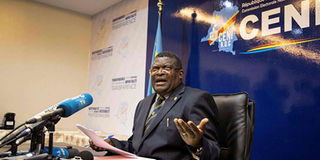Strike call, protests in DR Congo after new election delay

Independent Electoral Commission rapporteur Jean-Pierre Kalamba gives a press conference in Kinshasa on December 26, 2018. PHOTO | MARCO LONGARI | AFP
What you need to know:
- The vote should have been held in 2016 when President Joseph Kabila, in power since 2001, reached a two-term limit set under the constitution.
- The announcement by the Independent National Election Commission (CENI) blamed militia violence and an outbreak of Ebola in North Kivu, and inter-communal clashes in Yumbi.
BENI
A DR Congo opposition bloc called Thursday for a nationwide stoppage and police clashed with demonstrators in two eastern cities after upcoming elections were placed on hold in their region.
Lamuka, a coalition of parties supporting opposition candidate Martin Fayulu, called for cities to be brought to a standstill on Friday, two days before polling day.
On Wednesday, the Democratic Republic of Congo's national election panel announced the thrice-delayed vote would be postponed in several troubled areas until March.
But it said the vote would continue to take place in the rest of the country as scheduled on December 30, and the next president will be sworn in on January 18.
PROTESTS
Sunday's election will be the DRC's first presidential ballot in seven years. Legislative and municipal elections are being held at the same time.
In the province of North Kivu, the region most affected by the delay, several hundred demonstrators gathered on Thursday in the administrative district of the city of Beni.
Gunshots were heard over a roughly hour-long period, apparently fired by police to disperse protestors.
In Goma, the provincial capital, demonstrators set up barricades in the districts of Majengo and Katimbo and at the entrance to the university.
Police fired teargas and made at least half a dozen arrests, said an AFP reporter at the scene.
POWER
The vote should have been held in 2016 when President Joseph Kabila, in power since 2001, reached a two-term limit set under the constitution.
But he remained in office, invoking a caretaker clause under the constitution.
The election postponement applies to the cities of Beni and Butembo in North Kivu, as well as to the territory of Yumbi in the south western province of Mai-Ndombe.
Around three percent of some 40 million registered voters will be affected by the delay.
But opposition parties described the delay as a ploy to gag a stronghold of support.
EBOLA
At a press conference, Lamuka called for cities around the DRC to be brought to a standstill on Friday but said it would still contest the poll.
The election commission "has crossed a red line", said Lamuka, which is backed by two of the DRC's powerbrokers -- former warlord Jean-Pierre Bemba and the ex-governor of Katanga, Moise Katumbi.
The other main opposition party, the veteran Union for Democracy and Social Progress (UPDS), also said it "condemned" the new delay but confirmed on Wednesday it would not boycott the elections.
The announcement by the Independent National Election Commission (CENI) blamed militia violence and an outbreak of Ebola in North Kivu, and inter-communal clashes in Yumbi.
But a specialist in DRC law said the decision was flawed.
"It's unconstitutional," the expert said. "It deprives part of the electorate of its constitutional right to elect the leaders of their choice."
CONTENDERS
Three men are heading a field of 21 candidates in Sunday's presidential race.
They are Kabila's hand-picked successor Emmanuel Ramazani Shadary, a hardline former interior minister; Fayulu, a little-known legislator and former oil executive; and UPDS chief Felix Tshisekedi.
The elections were twice postponed until a new date was set for December 23 -- and were then delayed by another week.
CENI blamed a warehouse fire that destroyed election equipment.
The mineral-rich giant of central Africa has an entrenched reputation for political turmoil, corruption and poverty.
It has not had a peaceful transfer of power since gaining independence from Belgium in 1960.
PEACE
In 1996-1997 and 1998-2003, the DRC became the theatre of two wars that left millions dead and homeless and sucked in countries from around central and southern Africa.
The UN and western powers have repeatedly urged the DRC to have peaceful, transparent and free elections -- a call echoed on Wednesday by the presidents of Angola, Botswana, Namibia, Zambia and the neighbouring Republic of Congo.
The five leaders said they would send envoys to Kinshasa on Thursday.
Despite the problems, the head of the UN's mission to Congo, Leila Zerrougui, said this year's elections compared favourably with the 2011 ballot, marked by bloodshed and allegations of vote-rigging.
"I think this campaign has proceeded somewhat more smoothly," she said in an interview with Jeune Afrique (Young Africa) magazine.




